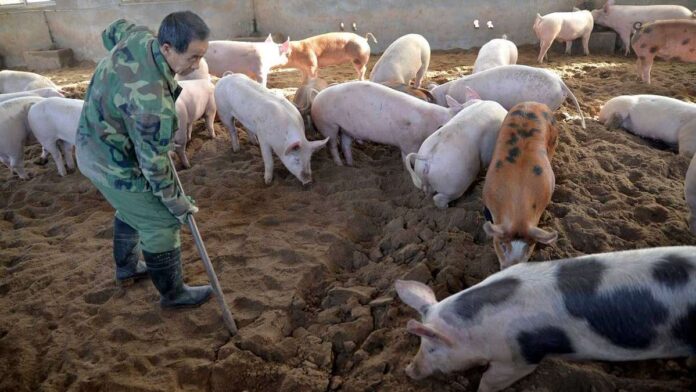In a tragic turn of events, Mizoram, the picturesque northeastern state of India, has been grappling with a severe outbreak of African Swine Fever (ASF), resulting in the loss of over 47,000 pigs between 2020 and 2023. The devastating impact of this viral disease has not only inflicted substantial economic losses upon pig farmers but also raised concerns about food security, livelihoods, and public health in the region.
African Swine Fever, caused by the African swine fever virus, is a highly contagious and often fatal disease affecting domestic and wild pigs. It poses no direct threat to human health but can have devastating consequences for pig populations and the swine industry. The virus is transmitted through various means, including direct contact with infected animals, contaminated feed or equipment, and through ticks or other vectors.
The outbreak of ASF in Mizoram has dealt a severe blow to the state’s pig farming sector, which plays a significant role in the livelihoods of many rural communities. Pigs are an integral part of the agrarian economy in Mizoram, providing a source of income, nutrition, and social capital for numerous households. The loss of over 47,000 pigs over the span of three years has had far-reaching implications for pig farmers, leading to financial distress, reduced household incomes, and disruption of traditional livelihood practices.
The economic impact of the ASF outbreak extends beyond individual households to the broader agricultural and rural economy of Mizoram. Pig farming contributes significantly to the state’s agricultural GDP and serves as a vital source of revenue generation, employment, and food security. The loss of a large number of pigs has resulted in decreased productivity, reduced market supply, and increased prices of pork products, thereby affecting consumers and traders alike.
Furthermore, the ASF outbreak has raised concerns about food security and nutrition in Mizoram, where pork is a staple part of the diet for many communities. The decline in pig populations has led to shortages in pork supply, exacerbating food insecurity and dietary deficiencies among vulnerable populations, particularly in rural and remote areas. The lack of access to affordable and nutritious protein sources can have detrimental effects on public health and well-being, especially among children and pregnant women.
In addition to its economic and nutritional implications, the ASF outbreak in Mizoram has underscored the importance of effective disease surveillance, control, and management strategies. Containing the spread of ASF requires coordinated efforts from government agencies, veterinary professionals, and local communities to implement preventive measures, such as biosecurity protocols, quarantine procedures, and vaccination campaigns. Timely detection and response to outbreaks are critical in preventing further transmission of the virus and mitigating its impact on pig populations.
The government of Mizoram, in collaboration with veterinary authorities and other stakeholders, has taken various measures to address the ASF outbreak and support affected pig farmers. These efforts include the implementation of biosecurity measures, surveillance and monitoring of pig populations, training and capacity-building initiatives for veterinary professionals and farmers, as well as financial assistance and compensation schemes for affected households.
Despite these efforts, challenges persist in containing the spread of ASF and mitigating its impact on pig farming communities in Mizoram. The transboundary nature of the disease, porous borders with neighboring states and countries, limited veterinary infrastructure, and lack of awareness among farmers about biosecurity practices pose significant challenges to disease control efforts.
Moving forward, there is a need for sustained investment in veterinary infrastructure, disease surveillance, and capacity-building initiatives to strengthen the resilience of Mizoram’s pig farming sector against future disease outbreaks. Additionally, greater emphasis on promoting diversified livelihood options, sustainable agricultural practices, and alternative sources of income can help reduce the dependency on pig farming and enhance the resilience of rural communities to economic shocks.
In addition, the outbreak of African Swine Fever in Mizoram has had profound socio-economic and public health implications, highlighting the vulnerability of pig farming communities to emerging infectious diseases. While efforts are underway to control the spread of ASF and support affected farmers, addressing the root causes of the outbreak and building resilience in the agricultural sector are essential for ensuring the long-term sustainability and well-being of rural communities in Mizoram.




